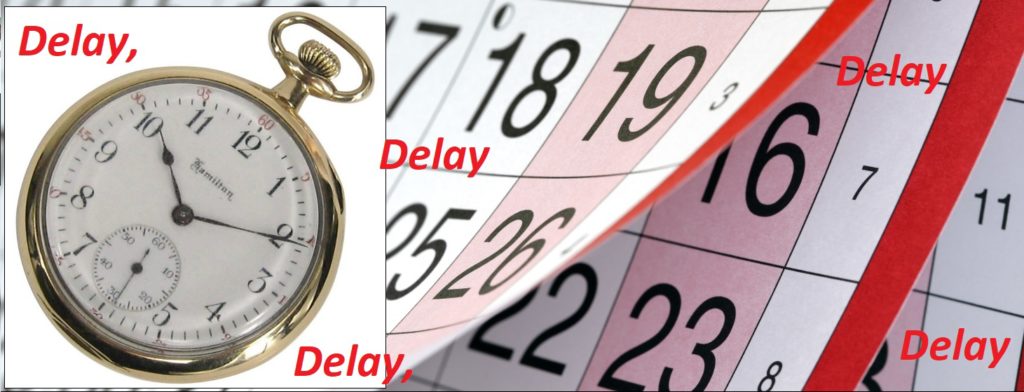Calling Them Evil Will Cost you Money: Invalidating the Insurance Policy by Pleading Intentional Conduct
The victim of a personal injury accident must be careful about representing that the person that harmed them was intentionally evil, or intended to harm them. That kind of representation can activate an insurance policy exclusion and make the policy inapplicable to the accident.
Ensuring an insurance policy applies is a critical advantage of hiring a personal injury, accident lawyer. That lawyer can walk the tightrope between maximizing the fault of the person that hurt you (the tortfeasor), and maximizing damages (the amount of money you get) by focusing your claims of clear fault, lack of comparative fault, punitive damages, and insurance bad faith.
Why spend time focusing on fault when the case facts are clear? The benefit is that clear, intentional fault tends to “bleed over” into damages, and tends to increase the value of the claim. What is the risk? There is a dark-side disadvantage to any claim of clear fault. Pressing the fault advantage, too far, can activate an insurance exclusion and end the money available to the claim.
Our Example – A Motor Vehicle Accident
Shane Johnson is a 26-year-old man living in Raymore, Missouri. He visited with some friends at a tavern off Main Street in Belton, Missouri. He had six drinks, all mixed with whiskey. It was 9:00p.m on a Thursday. Shane was driving home on 58 Highway eastbound from Belton to Raymore.
Jennifer Miller is a 37-year-old, healthy, married, mother of two young children from Harrisonville, Missouri. She works in Belton. She is a nurse at a senior living center. She is driving home from work. She is headed towards Interstate 49 in Belton, Missouri, and plans to drive south into Harrisonville.
Shane Johnson, driving, weaves in his lane, crosses over into the left lane, and collides into a Ford F-150 truck driven by Mrs. Jennifer Miller.
The collision pushes Mrs. Miller’s Ford F-150 truck to the left, off the north side of 58 Highway, and into the clear zone near the Belton Target store. Jennifer Miller’s truck strikes a light pole at 40 miles per hour. The Belton’s Police and emergency ambulance respond to the accident scene.
Our Example – The Arrest

Shane Johnson was tested using field sobriety techniques by the Belton Police Department at the scene of this car accident. After leaving the car accident scene, Mr. Johnson was tested with an Intoxalyzer 5000 breathalyzer machine at the Belton Police Department. Shane blew a .18 blood alcohol content (B.A.C.), more than double the legal limit. Shane was arrested under suspicion of driving while intoxicated. Mr. Johnson was given tickets for Belton Municipal Court for careless and imprudent driving, driving while intoxicated (DWI, a second offense), and failing to keep a proper lane.
Our Example – Criminal Court
 Shane Johnson hired a criminal defense lawyer for his Belton Municipal Court traffic tickets. The lawyer was able to keep Mr. Johnson out of prison. Shane avoided a felony charge for causing serious injury to Jennifer Miller while driving under the influence of alcohol (RSMo. 558.011 & 565.052). His criminal defense lawyer saved his driver’s license. However, Shane Johnson pled guilty in Belton Municipal Court, was convicted, and his record showed his driving while intoxicated (DWI), and careless and imprudent driving convictions.
Shane Johnson hired a criminal defense lawyer for his Belton Municipal Court traffic tickets. The lawyer was able to keep Mr. Johnson out of prison. Shane avoided a felony charge for causing serious injury to Jennifer Miller while driving under the influence of alcohol (RSMo. 558.011 & 565.052). His criminal defense lawyer saved his driver’s license. However, Shane Johnson pled guilty in Belton Municipal Court, was convicted, and his record showed his driving while intoxicated (DWI), and careless and imprudent driving convictions.
Our Example – The Injury
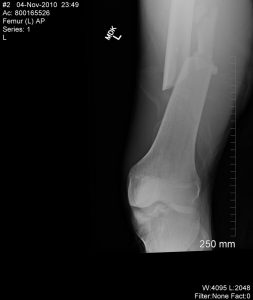 Jennifer Miller suffered a comminuted, oblique fracture to her femur (a broken leg), and several crushed foot bones. Namely, Mrs. Miller had crushed the cuboid, and first, and third metatarsals in her right foot. The comminuted, oblique, leg fracture indicates it was not a straight across fracture but that her leg bone was broken in multiple pieces.
Jennifer Miller suffered a comminuted, oblique fracture to her femur (a broken leg), and several crushed foot bones. Namely, Mrs. Miller had crushed the cuboid, and first, and third metatarsals in her right foot. The comminuted, oblique, leg fracture indicates it was not a straight across fracture but that her leg bone was broken in multiple pieces.
Our Example – Medical Treatment
Mrs. Miller was initially treated at Belton Research Hospital. She had follow-up care at Saint Luke’s East Hospital in Lee’s Summit, Missouri. Her medical treatment included an orthopedic surgeon. That surgeon performed an ORIF surgery (Open Reduction Internal Fixation) of the fracture of the femur in her right leg (a break in the biggest leg bone). Metal screws and plates were “fixed” to keep her femur, leg bone together. Mrs. Miller took prescription medications. Mrs. Miller had follow-up physical therapy in Belton, Missouri. She saw her primary care physician.
Our Example – Chronic Pain
The aftermath: Jennifer Miller suffers chronic problems in spite of the large effort she undertook to recover from her broken leg and broken foot. Mrs. Miller suffers complications by way of chronic knee pain (caused by nerve damage). She has chronic ankle pain from her broken foot bones. She has had to overcome a bone infection known as osteomyelitis. This has increased her medical treatment bills. It has increased her recovery time. She has chronic pain.
In Comes the Accident Lawyer
Mrs. Miller, as a victim of a motor vehicle accident, hired a personal injury lawyer skilled in Belton car accidents. His job was to help with the claim. The accident lawyer investigated. He gathered evidence. He submitted a detailed demand letter to Mr. Johnson’s insurer for his policy limits.
Why the Insurance Company Denied Her Claim
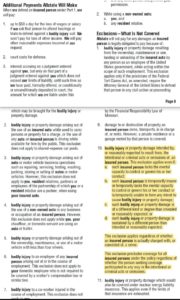
Mr. Shane Johnson had an insurance policy that featured a common policy clause. That clause reads that “bodily injury or property damage intended by, or reasonably expected to result from the intentional or criminal acts or admissions of an insured person, shall be excluded by this policy.” Exclusion policy clauses like this apply irrespective of whether the insured person was actually charged with, or convicted of a crime.
In this case, Mr. Shane Johnson was indeed charged with, and convicted of the crimes of driving while intoxicated, and careless and imprudent driving. The insurance policy exclusion specifically stated it precluded coverage for all insured persons, even if the person seeking coverage did not participate in the intentional or criminal act.
The insurance company denied Jennifer Miller’s claim. The insurer stated there is no policy money to give, because the policy did not apply, because Shane Johnson had acted intentionally and criminally.
The Law on Criminal Act Insurance Policy Exclusions
An insurance company, in Missouri, has a duty to defend an insured whenever there is a potential or possible liability to pay, based upon the facts known at the outset of the case. The duty to defend is not dependent upon the probable liability to pay, or based upon facts ascertained only through trial. It is from the initial facts. McCormick Baron Mgmt. Servs., Inc. v. Amer. Guarantee & Liab. Ins. Co., 989 S.W.2d 168, 170 (Mo. banc 1999).
An insurance company does not have a duty to defend a lawsuit; where the petition (or initial claim), upon its face, alleges a set of facts which fail to bring the case within the coverage of its policy. Train Wreck West, Inc. v. Burlington Ins. Co., 235 S.W.3d 33, 42 (Mo. App. E.D. 2007).
Merely mentioning the word “negligence” does not trigger the duty to defend or pay a claim. Instead, the duty to defend, or pay an insurance claim, arises from the actual factual allegations presented through the demand letter, or investigation by the insurer. If that demand letter, or investigation demonstrates intentional conduct, an insurance exclusion may apply. See Allen v. Continental W. Ins. Co., No. ED 99111, 2013 WL 1803476, * 6 (Mo. App. E.D. 2013). In our case, the claim of Jennifer Miller revealed facts of intentional, criminal conduct by Shane Johnson, which could activate the criminal and intentional act exclusion of his car insurance policy.
The Law Does Not Allow People to Insure for their Intentional Crimes
 “Missouri courts have consistently held that an insured’s intentional infliction of damage … cannot be covered by liability insurance.” Easley v. Am. Family Mut. Ins. Co., 847 S.W.2d 811, 812 (Mo. App. W.D. 1992). “Permitting an insured to insure himself against his wanton, reckless, or willful acts would enable him to insure himself from bearing the consequences of his intentional acts and would therefore, be contrary to public policy.” Easley, 847 S.W.2d at 812. In other words, an insurer is not liable for an insured’s conduct when the insured acted volitionally and within intent to injure. See State Farm Fire & Cas. Co. v. Caley, 936 S.W.2d 250, 253 (Mo. App. W.D. 1997). What is more, under this case, intentional conduct cannot later be characterized by the victim or their attorney as negligence merely because the damage resulted was greater than or different then what was intended by the insured. Thus, Shane Johnson cannot say he did not intend to harm Jennifer Miller and did not intend to injury her so severely and therefore his conduct was not intentional or criminal. It is the act itself, rather than the consequences of the action, which determines insurance applicability.
“Missouri courts have consistently held that an insured’s intentional infliction of damage … cannot be covered by liability insurance.” Easley v. Am. Family Mut. Ins. Co., 847 S.W.2d 811, 812 (Mo. App. W.D. 1992). “Permitting an insured to insure himself against his wanton, reckless, or willful acts would enable him to insure himself from bearing the consequences of his intentional acts and would therefore, be contrary to public policy.” Easley, 847 S.W.2d at 812. In other words, an insurer is not liable for an insured’s conduct when the insured acted volitionally and within intent to injure. See State Farm Fire & Cas. Co. v. Caley, 936 S.W.2d 250, 253 (Mo. App. W.D. 1997). What is more, under this case, intentional conduct cannot later be characterized by the victim or their attorney as negligence merely because the damage resulted was greater than or different then what was intended by the insured. Thus, Shane Johnson cannot say he did not intend to harm Jennifer Miller and did not intend to injury her so severely and therefore his conduct was not intentional or criminal. It is the act itself, rather than the consequences of the action, which determines insurance applicability.
No Insurance Duty to Defend or Pay for Crime
Under these circumstances, the insurer of the person that harmed Jennifer Miller was under no duty to defend him or pay the claim resulting from the Belton car accident he caused. Shane Johnson’s actions were intentional, criminal conduct. He admitted the criminal nature of his conduct by pleading guilty in Belton Municipal Court. Res judicata applied, as his intentional conduct was solidified by his conviction in criminal court. Thus, the insurance provided no claim money based upon the applicability of the intentional act exclusion under Shane’s insurance policy.
What To Do: Avoid the Policy Exclusion For Intentional Conduct
The best personal injury lawyer for a car accident should successfully avoid the criminal act insurance exclusion problem. The first step is to recognize the issue. Then, one must prepare in advance. At each stage of the investigation; the demand letter, the pleadings, and evidence presented, the facts should be framed to make the person that caused the injury look negligent, but not criminal. You make them look evil; you may lose all the money.
A competent car accident lawyer will begin by framing his demand letter by using the Missouri Approved Instructions for a jury verdict. This demand letter language, and the evidence supporting it will emphasize the negligence claims and not overtly claim intentional conduct. The accident lawyer should frame the guilty plea as a guilty plea to negligence. He should frame the conviction as deciding the issue of negligence. Under Missouri law, ambiguities in an insurance policy are interpreted to benefit coverage and to avoid exclusions.
Your In-Court Pleadings Should Allege Negligence and Not Intentional Crime
It is often the case that negotiations will not successfully settle a personal injury car accident. A lawsuit will need to be filed. A pleading called a “Petition for Damages” will need to be prepared and filed with the court. Your Petition will set out the ways in which the person (here, Shane Johnson) was neglectful in his driving and failed to drive as a very careful person with the highest degree of care (which is Missouri’s standard).
The Petition for Damages should not focus on intentional conduct. It should not focus on a crime or the conviction. The deposition of each witness should follow a similar strategy. A deposition, which is a formal, on the record, under oath recording of the person’s testimony, will occur. That deposition should focus on the neglectful and careless acts of the defendant, but not focus on intentional or criminal conduct.
Walking to the Precipice with Punitive Damages
Punitive damages often are and should be pled and pursued in a case. Punitive damage claims with an underlying criminal act insurance clause does require a very skilled personal injury lawyer. Punitive damages are damages at or above the amount actually suffered by the victim. They are additional damages to be paid, in part, to the victim to punish the bad acts of the person who harmed them. The policy supporting punitive damages aims to detour other persons from engaging in evil conduct in the future. Punitive damages help society.
The Test to Prove Punitive Damages
The test for punitive damages in Missouri requires clear and convincing proof of culpable mental state. Drury v Missouri Youth Soccer Association, 259 S.W.3d 558, 573 (Mo. App. 2008). The standard to prove punitive damages is very close to the standard to prove intentional, criminal conduct. The law requires a conclusion that the defendant had an “evil motive.” Davis v. Chatter Inc., 270 S.W.3d 471, 480 (Mo. App. WD 2008). The test is to show either that the defendant committed an intentional, wanton, willful, and outrageous act without justification, or acted with reckless disregard for the victim’s rights and interests.” Calus v Intrigue Hotels, LLC, 328 S.W.3d 777, 783 (Mo. App. W.D. 2010). One can see how the facts needed to prove a punitive damages claim mirror the facts to exclude insurance through intentional, criminal conduct. “Threading this needle” may take the skills of the best personal injury lawyer for a car accident. It should be planned for in advance, in great specificity.
An Example – Suing O.J. Simpson for Murder
One may remember from the early 1990’s; O.J. Simpson was accused of murdering his wife and her male companion. A trial resulted which ended in OJ’s acquittal on criminal charges. Fewer people know that a later civil case was filed against OJ Simpson by the wrongful death class of the victims’ heirs. This wrongful death civil case did not allege O.J. Simpson intentionally, criminally killed the two people. Instead the claim pulled back a bit. The wrongful death class asserted reckless conduct. A large settlement was paid. This is an example of careful pleading in the light of criminal act insurance exclusions.
What to do?
Most personal injury and wrongful death claims will not involve actions so egregious as to give rise to the potential for an insurance exclusion for intentional or criminal conduct. However; crimes occur. People harm intentionally. Bad people purposely injure, even kill others.
Those harms need to be compensated. Victim damages must be recouped. Families need to be helped. In these situations, one must not merely charge ahead and paint the person who did the harm as evil and intentionally acting. Care should be taken to plan the path to achieve the end result you wish. The goal should not be revenge. The goal should be successfully winning compensation, using the legal system to avoid these pitfalls. Begin with the end in mind.
 Matt Hamilton
Matt Hamilton
- Juris Doctor
- Trial Lawyer

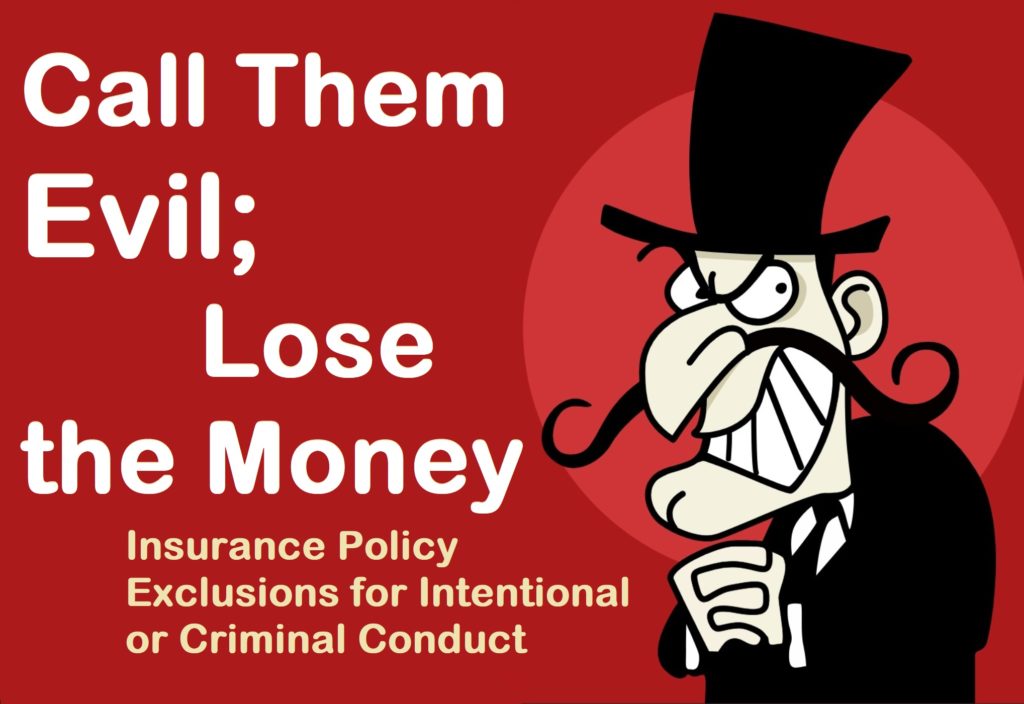

 Speeding tickets for faster speeds that appear on your driving record will raise your insurance premium costs more than convictions for lower speeds. Speeding ticket convictions appear on a driving record typically in five mile per hour increments.
Speeding tickets for faster speeds that appear on your driving record will raise your insurance premium costs more than convictions for lower speeds. Speeding ticket convictions appear on a driving record typically in five mile per hour increments. The amount of money you pay a car insurance company to insure your vehicle is calculated by a number of factors. To start; the insurance company determines what they can know about you; that is, what they can find out about you.
The amount of money you pay a car insurance company to insure your vehicle is calculated by a number of factors. To start; the insurance company determines what they can know about you; that is, what they can find out about you. Each driver insured on the road is categorized by insurance companies. These companies seek to maximize their profit (the insurance premiums you pay), and minimize their costs (advertising for customers and paying accident claims).
Each driver insured on the road is categorized by insurance companies. These companies seek to maximize their profit (the insurance premiums you pay), and minimize their costs (advertising for customers and paying accident claims). Another recent study considered quotes from the five states with the highest population. A comparison was made between drivers with a clean record versus drivers with one speeding conviction on their record (6-10 mph over).
Another recent study considered quotes from the five states with the highest population. A comparison was made between drivers with a clean record versus drivers with one speeding conviction on their record (6-10 mph over). Most insurance companies raise premium quotes by looking back three years. However, if your insurance costs rise, and you still pay the higher expensive insurance, it is reasonable to expect the insurance company to take your money for as long as it can … so, indefinitely.
Most insurance companies raise premium quotes by looking back three years. However, if your insurance costs rise, and you still pay the higher expensive insurance, it is reasonable to expect the insurance company to take your money for as long as it can … so, indefinitely. The amount you pay for auto insurance (your premium) is based in large part on how risky you appear to the insurer. Insurance companies have a limited number of ways at their disposal to evaluate drivers. The insurer does not know how well you see, how fast your reactions are, your level of wisdom, or your focus. The insurance company does know what type of car you drive, where you live, your claims history, and yes, your driving record.
The amount you pay for auto insurance (your premium) is based in large part on how risky you appear to the insurer. Insurance companies have a limited number of ways at their disposal to evaluate drivers. The insurer does not know how well you see, how fast your reactions are, your level of wisdom, or your focus. The insurance company does know what type of car you drive, where you live, your claims history, and yes, your driving record. Insurance companies use different policies for different types of drivers. Some policies are very “pro-driver” and give great accident coverage. Other types of insurance policies are less generous.
Insurance companies use different policies for different types of drivers. Some policies are very “pro-driver” and give great accident coverage. Other types of insurance policies are less generous.
 Matt Hamilton
Matt Hamilton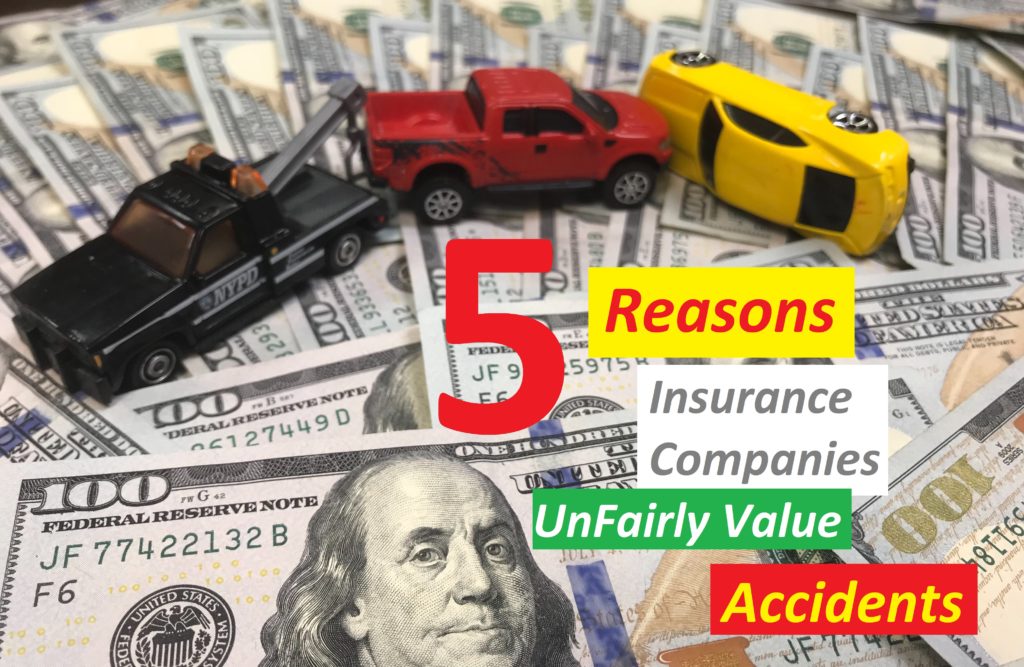 FIVE REASONS WHY INSURANCE COMPANIES DO NOT FAIRLY PAY ACCIDENT CLAIMS
FIVE REASONS WHY INSURANCE COMPANIES DO NOT FAIRLY PAY ACCIDENT CLAIMS